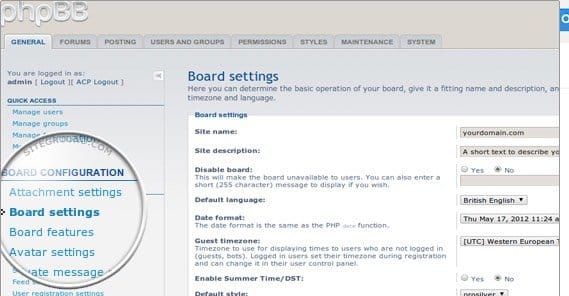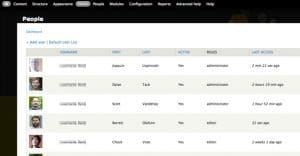Will Forum Links Still Help Increase Your Site’s Rankings?

Web forums have a bad name, they aren’t very potent as far as link building goes, and they’re an outdated technique that could easily be considered a relic of a time long past. Do they still work at all for SEO? Can they hurt you? Let’s take a look.
Black Hat Forum Spam
There’s a reason using forums to build SEO value has a bad name, and that’s because of years of abuse by black hat webmasters. These spammers would go around to every web forum they can find and leave their links. If the forum was active, the link might be removed, or it might not. If the forum was relatively inactive, nothing would happen to the link, and it would sit there passively gaining the linked site some minor SEO value. The web forums themselves weren’t black hat or spam, so they still had positive PageRank to pass to the spammer’s site.
More sophisticated but equally terrible is the method where you register for the forums and post normally, with a link to your site in your signature. You then post as much as possible, so your link shows up everywhere, without you directly advertising it.
Here’s the thing; both of these methods tend to be against the rules of any forum with visiting. If the forum you’re visiting doesn’t have enough moderation to enforce it, it also doesn’t have enough activity to be a site with any appreciable value to you.
Don’t use these black hat techniques. They’ll get you warned or banned from just about any forum, and they don’t work.
The SEO Mechanics of Forums
Google has long recommended that forum owners make the links on their boards into nofollow links. Nofollow links, obviously, don’t pass PageRank and aren’t valuable to SEO. It’s not a default setting in some board software setups, like PHPBB, but it’s very easy to implement with a simple mod.
Mechanically, forum links will do nothing for your SEO, in general. In many cases, the owner of the board will have set them to nofollow. Even if the board owner hasn’t, Google puts very little stock in a vast majority of web forums. Most forums are not active enough, are not large enough, and are not considered authoritative enough to give you much ranking benefit at all.
In general, then, no; web forum posts and links will not help your SEO in a direct and tangible way. The only exception to this rule is large, authority web forums, like Stack Exchange, Reddit, or high profile niche forums.
The Value of Forum Posts
The trick to using web forums for website benefit is to realize that they aren’t supposed to be treated like websites or like blog comment sections. They’re more like social networks. Web forums are the prototypical social networks; hubs where people of similar interests gather to discuss those interests.
The value of a web forum, then, comes from your ability to attract the attention of users on the web forum and get them to take actions that benefit your site. They might like your pages and share them socially. They might leave blog comments or social comments that enhance your community. They might even own blogs themselves, and blog about your content, in a way that does benefit your SEO. Just because a forum is nofollowed doesn’t mean all the blogs owned by the users are.
The goal, then, is to make yourself valuable to the users of the forum. Sound familiar? It should. Providing value to users is the number one guideline Google puts forth to direct every aspect of SEO.
Picking Forums to Use
If you want to try to make use of forums for SEO and website benefit, you need to pick those forums properly. You can’t just go to any old web forum and hope you can find some value in it. You need to be picky. You need to make it seem as though your presence is an exclusive bit of value on its own, rather than a given for every related community on the web. Here are some guidelines to help you pick such forums.
Your forum needs to be relevant. There’s no sense in going to post on Digital Point if you’re not trying to advertise something that promotes internet marketing in some fashion. There’s no sense in going to Mazda World if your site has nothing to do with cars. This means there are two types of forums you’ll be targeting.
The first type of forum is the niche forum. These are, like Mazda World or Moz or Warrior Forum, boards dedicated to one topic and that topic alone. They won’t be as large as the other category, but they will give you a better opportunity to get to know members, and to find a position of authority.
The second type is the broad, general interest forums with a lot of niche subsections. Reddit is a prime example of this, as is SomethingAwful and, to a lesser extent, 4chan. All three of them have rules against advertising, and all three of them have marketers using them to reach certain targeted demographics in certain subsections of their sites. Just be aware that if you’re going to try to use one of these sites, you need to be very careful, because the users can and will call you out on your shenanigans and you can easily find yourself banned.
Your forum needs high activity. This should go without saying. If you think of a forum as a social network, you can consider that everyone follows everyone else. When you create a profile, you don’t need to build up an audience; it’s right there, as an active member list. Your job is just to figure out what will attract them to a thread, and what you can do to provide a quality thread for them.
Your forum needs rules against spam and advertising. Most of the best forums online have these rules, and that’s a good thing. Even though you’re going into it with the intent to advertise, you’re not doing it in a spammy way, which is what those rules are designed to prevent. As Reddit says: “It’s okay to be a Redditor with a website; it’s not okay to be a marketer using Reddit.” In other words, it all depends on your attitude, where you’re coming from.
Your forum needs middling to heavy moderation. You don’t need draconian, SomethingAwful-style banned-at-the-drop-of-a-hat moderation. You should avoid 4Chan-style completely-absent moderation. A happy medium exists on many high profile forums, where moderators arbitrate disputes and keep the peace, but don’t censor anything beyond spam and posts in violations with certain rules. Too much moderation makes for a harassed environment, while too little makes for a spammy site or a site filled with content you frankly don’t want to be associated with in the first place.
Your forum needs to be an authority site, or attached to an authority site. Some forums are authorities on their own, like the often-mentioned Reddit. Some aren’t. Moz’s community forums are attached to the authority of Moz.com, and that’s good enough. That’s what you’re looking for; active forums attached to quality sites.
Your forum should be nofollow, or at least have restrictions on followed links. Forums that boast about followed links are havens for black hats and spammers, company you do not want to keep. This just goes along with the rules and moderation, above. Really, even a great link from a great authority forum isn’t going to give you that much benefit.
Your forum should require registration to post. If the board is open to guest posts, it’s a huge warning sign that it can be abused by spambots at a moments notice. You don’t necessarily need to go so far as SomethingAwful’s paid accounts, but guest posting is bad.
Additionally, you should know how visible your forum is to guests. Again, SomethingAwful tends to block guests from seeing most of their forum, whereas sites like Reddit do not, at least not on a wide scale. Consider that links that aren’t visible to guests aren’t crawled by Google.
Also, think about other advertising options through the forum you choose. Reddit and SomethingAwful both sell ad space, for example, and other forums might use specific ad networks or Google ads. You can take advantage of these to advertise as well.
How to Use Your Selected Forums
Ideally, you should have a list of no more than a dozen forums. See, you’re going to be participating in discussions on these forums, and that means you need to be active enough to check them and find opportunities to reply. If you’re trying to take part on too many boards at once, you’re going to run out of time.
First, make sure you fill out any profile information you can, including an avatar, a bio, and a link to your website. Don’t add the link to your signature! Signature links are spam to many forums, and some boards – like Reddit – don’t even have them. Remember, you’re going for “normal member with a lot of knowledge” here, not marketer.
Second, begin to participate in conversations on the board. Use it as a user, not as a marketer. On Reddit, this means finding relevant subreddits related to your topic and watching the content that circulates through. Comment on content, add your thoughts, and post your own content where relevant. You might also consider awarding Reddit Gold – their temporary account upgrades – to particularly insightful posters.
Third, look for interest in a deeper topic on which you are an authority. This is what you’re going to spend a lot of time doing. You might notice that in one thread, people often ask the same four or five questions over and over. If there’s no good resource for those questions on the board, why not make one? Splinter threads work well, and you can post the link in the original thread.
In particular, you want to position yourself as an intelligent and resourceful member of the forum, who has access to information and the ability to share it. You’re not posting “Hey this is my website come check it out.” You’re posting “This is what I know about this topic, and here are links to sites X, Y, and Z to read more.” It just happens that site X is your site, with a deeper, more detailed blog post.
When you find a topic you can cover that hasn’t been covered before, create a robust post that compiles information and resources. Include links to authority sites and your own site when relevant. Again, you’re making a post that is a resource, that leads to other resources, among which is your site. You don’t need to acknowledge that it’s your site, unless board rules demand it.
Much like with social media and blogging in general, the goal of all of this is to establish yourself as an authority. As you grow in recognition on these boards, more people who have sites of their own will take notice. You’ll be able to reach out to them – or they will reach out to you – for collaborations. You can link to each other, you can guest post, and more. The sky is the limit with these relationships.
Try to scale your efforts to the sites that have the best rewards, but don’t make that determination right away. It takes time to build name recognition and goodwill through a forum. If you abandon it too quickly, you’ll end up leaving behind valuable opportunities. If you’re looking for immediate results, you can use paid advertising options, like the Reddit ads I mentioned above.
Again, forums are very much like social media in many respects, and using them to grow is much like organic SEO. It’s a slow process, and it requires you to be genuine, valuable, and helpful to the other users of the board. This makes “stupid questions” threads an ideal haven for you to watch, for example.
Making Your Own Forum
There’s another option that hasn’t been discussed yet, and that’s the concept of making your own forum community. This is risky, because you need to establish all of those qualities you’re looking for in a forum, yourself. You need moderation, you need rules, you need focus, etc. The problem is, by building the forum yourself, you’re treating it even more like a social network. That is, you need to grow it from scratch.
If you want to do this, you can benefit greatly by becoming a central hub of discussion and data. You just need to maintain it carefully and promote it anywhere you can.
You can make a free board using something like Invision, Zetaboards, or ProBoards. I don’t recommend this, for all of the same reasons I don’t recommend free web hosts or a Blogger/WordPress.com hosted site over a self-hosted solution. It’s not under your control, it’s not customizable, and it’s easy to fail.
The alternative is to use something like VBulletin or PHPBB to create a board from scratch. These are the forum equivalents to WordPress.org, and they can be expanded with extensions and plugins to make them look and act however you want them to look and act.
I don’t have a lot of advice for you about running a web forum. I can tell you, though, it will take a very long time before that forum shows you any appreciable returns. Most of the time, creating a forum is just asking for about 15 users to get into petty squabbles over trivial details. You have to put a lot of work into maintaining and growing them if you want them to expand. Unfortunately, the heyday of forums has been over for a few years.
Honestly, it’s probably easier just to create a personal subreddit and call that your forum. You can take advantage of Reddit’s authority, while also creating a space you control and can use for marketing purposes, in a non-overt manner. There just isn’t much reason to create a web forum on your own hosting and your own domain any more.
 ContentPowered.com
ContentPowered.com






